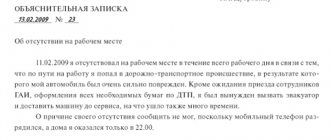Legal consultation > Administrative law > Document preparation > How to correctly write an explanatory note about being late for work?
Being late is one of the most common violations of labor discipline, and it is difficult to find an employee who has not committed it at least once in his life. If an employee is late, he must explain the reasons for the offense to the employer; for this, an explanatory note is written.
According to Art. 193 of the Labor Code of the Russian Federation, the employee may refuse to write it, but this does not deprive the employer of the right to apply a disciplinary sanction. An explanatory note about being late for work is an opportunity to justify yourself and prove that the offense was committed for good reasons, but it must be drawn up correctly.
Being late: concept and main reasons
Lateness is considered to be arriving at work later than the scheduled time. Interval: from one minute to 4 hours in a row, after that it’s time to skip.
An explanatory document is a type of official document, which, although drawn up in any form, should still be adhered to in a business style. The recommendation is conditional. Of course, a lawyer, journalist or other talkative specialist will easily and beautifully describe the compelling reasons for their action. But you can hardly expect such verbal outpourings from a carpenter, turner or driver. And everyone is late.
The delay may go unnoticed, then there will be no need to explain. But if an employee of a budget organization is caught, there are two working days for excuses. This is exactly the period established by Art. 193 Labor Code of the Russian Federation.
From practice, we can highlight the main reasons why people are delayed:
- traffic jams;
- health problems;
- water pipe break;
- car breakdown;
- the door lock is broken;
- stopped by traffic cops;
- the alarm did not go off;
- detained at school or kindergarten.
It is clear that employees can lie, therefore, in addition to stating the reason, the employer has the right to demand documentary evidence of what happened.
Structure of this document
- The specific form of this document is not fixed in Russian legislation - it is arbitrary, but without a specific plan it is difficult to write such a document. In jurisprudence, an explanatory note is divided into sections:
- The first element is the header. This area is where they write to whom this note is addressed. An explanatory note is usually written addressed to the head of a structural unit or organization.
- Then the title - “Explanatory Note”, is written without quotation marks.
- Date and document number.
- Title.
- Text of the document - briefly indicates the fact of lateness, then its reason.
- The official document is completed by the signature of the latecomer: his position, signature, initials and surname.
Despite the availability of modern technology, it is better to draw up an explanatory note by hand. This will help the employee to reinsure himself against false accusations from management, and the employer will be protected from untrue statements made against him.
What is considered evidence
The main question is how to prove that the reason is valid.
If the lock is jammed, then the door probably had to be “opened” by resorting to the help of a specialist. In this case, the employee can provide a receipt for payment for services and a certificate indicating the time of completion of the work.
Health problems are proven by an extract from the medical record.
Pipe burst - a certificate from the utility service.
Registration of a fine by traffic police officers - a copy of the protocol.
Among residents of large cities who are late for work, the leading explanatory explanation is: being late for work due to traffic jams. And here questions arise: for the employee - how to prove it, and for the employer - is it worth accepting such an argument. You can confirm the fact of a traffic jam using technical means: screenshots of computer programs that record road problems; even a recording of a radio host who reported that “at 5 km. There has been a traffic jam on the Warsaw highway since seven in the morning.” Below is an example of an explanatory note about being late for work for precisely this reason.
An employee’s refusal to write an explanatory note for being late for work
It is not necessary to have a heart-to-heart talk with your employer about why you were late for work. It is the right of every worker to refuse to write an explanatory note. But you should also remember how this can affect the outcome of the conflict.
Drawing up a report on the employee’s refusal to submit an explanatory note
If the latecomer has no desire to draw up an explanatory note, the administration initiates the drawing up of a report on this. If the employer’s demand is ignored, the act must be drawn up after two days, which are allotted for drawing up the explanatory note.
The act is signed by several employees, including the employee who committed the disciplinary offense.
The act must indicate:
- date of compilation, including year, month, day and specific time;
- the place where the document was drawn up (usually the office of a company, enterprise or other employee’s workplace);
- the surname and name of the witnesses who were personally present when the refusal to provide explanations occurred;
- reasons for drawing up the act.
Believe it or not
The Labor Code does not contain an exhaustive list of valid reasons; it does not disclose the criteria for when to believe and when not to believe an employee. Therefore, “being stuck in traffic jams” can indeed prevent a person from showing up for work on time, but does not relieve him of responsibility for violating labor discipline. That is, he can be disciplined for being late.
Let us recall that, according to Art. 192 of the Labor Code of the Russian Federation, a reprimand, reprimand or dismissal can be applied to an employee as a disciplinary sanction. For the first lateness, a reprimand is usually applied, then progressively a reprimand, and for those who are especially unpunctual, dismissal. The final measure will not be for being late as such, but for the systematic nature of such behavior.
Punishment
If the employer was able to reasonably prove that the employee was late for work unreasonably, and in writing the explanatory note distorted the real circumstances, he has the right to punish the employee.
Being late is clearly a disciplinary offense, since the operating hours of an enterprise or company are established by labor regulations. It is the violation of such rules that entails the application of sanctions in Article 192.
If there is a delay of more than 4 hours, then this is recognized as absenteeism and the employer has the right to fire for a one-time gross violation of labor discipline.
True, one should take into account the explanations of the plenum of the Supreme Court on this issue. He points out a number of circumstances that are necessary to make such a tough decision:
- disrespectful actions of the employee in all cases of lateness or absenteeism;
- tardiness, which turns into absenteeism, must be no less than the entire work shift established at the enterprise;
- fact of being late by more than 4 hours;
In any case, the employer always has at least three options:
- drawing up a dismissal order and notifying the employee of its contents;
- announcement of disciplinary action;
- conducting a conversation and the absence of formal actions on the part of the employer.
The most severe punishment for being late may be dismissal, however, as we have already said, there must be additional grounds for such a decision by the management of a company or enterprise.
For the first time being late
The maximum penalty for being late for the first time is a reprimand or reprimand. In any case, labor laws limit the employer's right to dismiss an employee immediately. For such a decision, it is necessary to find compelling reasons for three components:
- “repeatedness” of the employee’s actions;
- established fact of lateness not for valid reasons;
- the presence of not only lateness, but also failure to fulfill work duties.
The last criterion is rarely taken into account, but it should be taken into account, since an efficient employee after being late can make up for lost time before the end of the shift. The absence of one of the components for which the recovery is carried out may lead to the inconsistency of all arguments.
Therefore, there is a possibility that if an employee is late unintentionally, and this is not his personal fault, the maximum punishment he can receive is a reprimand or reprimand.
For the second delay
If a second delay is recorded, then this is a “red” signal for the enterprise employee. Now the company's management can fire him without further explanation.
In connection with being late for work again, an explanatory document is also left - a note signed by the employee. Its content should also explain the reasons for being late and justify them with unforeseen circumstances beyond the employee’s control.
For regular lateness
Formally, being late for the second time is a reason to apply an article of the labor code that directly provides for dismissal. However, most HR services of enterprises act precisely after an employee is late for work for the third time. Here there is systematicity and failure to fulfill obligations, which can lead to a violation of the labor discipline of the enterprise and loss of economic benefits.
A court or other government agency does not have the right to overturn an employer’s decision to dismiss an employee. The only chance to recover is to prove the inconsistency of the administration’s actions and the employer’s incorrect understanding of the law. In this case, it is not the method of punishment that is considered, but the argumentation for the application of a specific article of the labor code.
If regular lateness occurred and this is proven by documents, including time sheets, witness statements and other factual data, the owner has the indisputable right to dismiss the negligent employee from the owner.
Is it possible to punish with a ruble?
Labor legislation does not provide for direct punishment in the form of fines for being late.
The Code explicitly states that the types of disciplinary sanctions for employees are strictly limited. Fines are not included in the list of these penalties.
The listed norms of the Labor Code of the Russian Federation are clearly in the hands of the company employee. But punishing an employee by confiscating part of the material reward is quite possible. The employer can use other articles of the code that will help him take away part of the material reward for committing a disciplinary violation.
If you carefully read the articles of the code on bonuses for employees and the employment contract, it is easy to find out that the bonus is paid only upon achievement of production results and for the conscientious performance of job duties. Being late for work is a clear violation of work duties. Therefore, it is quite possible to exclude a careless employee who is late for work from the list of bonuses.
He may also be deprived of additional social guarantees that are not provided for by law. Such bonuses are provided to employees by a bilateral agreement between the employer and employee. This could be the use of company parking, which is paid for by the company, or the ordering of a corporate vacation, fully financed by the company. In this case, the company management has the right to exclude the name of the labor discipline violator from the list. But you can’t overdo it here either.
Judicial practice says that such measures can become the basis for legal disputes, in which the court usually takes the employee’s side.
An explanatory note that clearly indicates that the employee will work out the time that he did not spend at the workplace can serve as a mitigating circumstance and an attempt to find reconciliation. In this way, the costs of its maintenance will be compensated, and the work can be carried out as an increased intensity and not necessarily measured in additional hours at the office desk or lathe.
What else you should know
It’s good if the attendance of employees of a budget organization is recorded automatically - using electronic passes. But technical devices are not available everywhere, so more often the time of untimely attendance is recorded in an act. If the employee denies the obvious, such an act will serve as the only evidence of a violation. It is important to formalize it correctly so that later there are no grounds for canceling the applied disciplinary sanction.
It is also necessary to keep in mind that the employee has the right to refuse to give explanations. In order to bring him to disciplinary liability in this case, it is necessary to give him a written Order to give explanations. From the moment of its delivery, the two-day period begins to count.









